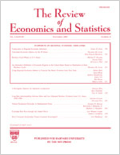
REVIEW OF ECONOMICS AND STATISTICS
Scope & Guideline
Transforming data into impactful economic narratives.
Introduction
Aims and Scopes
- Empirical Economic Analysis:
The journal emphasizes rigorous empirical research that employs various methodologies, including experimental, observational, and econometric techniques, to analyze economic behavior and outcomes. - Interdisciplinary Approaches:
Research published in the journal often incorporates insights from other disciplines, such as psychology, sociology, and political science, to enrich economic analysis and address complex social issues. - Policy-Relevant Research:
The journal seeks to publish studies that have direct implications for public policy, particularly in areas like health economics, education, labor markets, and environmental economics. - Historical and Institutional Perspectives:
The journal includes research that examines economic issues through historical contexts or focuses on the role of institutions in shaping economic outcomes. - Innovative Methodological Contributions:
The journal is also open to novel methodological advancements in economic research, including new models, estimation techniques, and data analysis methods.
Trending and Emerging
- Behavioral Economics and Decision-Making:
An increasing number of papers explore behavioral biases and decision-making processes among individuals and firms, highlighting the psychological factors that influence economic behavior. - Health Economics and Public Health:
There is a notable rise in research addressing health-related economic issues, particularly in the context of public health crises such as the COVID-19 pandemic, with a focus on health policy, access to care, and economic outcomes. - Environmental Economics and Sustainability:
Research on environmental degradation, climate change, and sustainable practices is gaining traction, reflecting growing concerns about environmental impacts on economic systems. - Digital Economy and Technology Impact:
The impact of technology on economic behavior, productivity, and market dynamics is becoming a focal point, with studies examining the implications of digitalization, automation, and data analytics. - Inequality and Social Justice:
Emerging themes include investigations into economic inequality, social mobility, and the effects of policy interventions aimed at promoting equity and justice in economic systems.
Declining or Waning
- Traditional Labor Market Analysis:
Research focused solely on traditional labor market dynamics, such as wage determination and employment rates, has become less frequent, possibly overshadowed by more nuanced explorations of labor issues, including discrimination and the gig economy. - Basic Trade Theory:
Publications centered on foundational trade theories have decreased as the field moves towards more complex analyses involving global supply chains, trade policy impacts, and the effects of technological change on trade. - Static Economic Models:
The reliance on static models of economic analysis appears to be waning, with a growing emphasis on dynamic models that account for time-varying behaviors and structural changes in the economy. - Purely Theoretical Contributions:
There seems to be a decline in purely theoretical papers that do not incorporate empirical evidence, as the journal increasingly favors research that combines theory with robust data analysis. - Regional Economic Studies:
Research focusing solely on specific regional economic issues without broader implications or comparisons has seen a reduction in publication frequency, as the journal aims for more comprehensive analyses.
Similar Journals
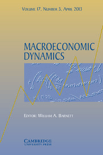
MACROECONOMIC DYNAMICS
Innovating Research for a Dynamic Economic FutureMACROECONOMIC DYNAMICS, a distinguished academic journal published by Cambridge University Press, serves as a pivotal platform for innovative research in the fields of economics and econometrics. With its ISSN 1365-1005 and E-ISSN 1469-8056, the journal has been at the forefront of scholarly communication since its inception in 1997, offering an extensive range of articles that explore dynamic economic models, policy impacts, and theoretical advancements through the latest empirical analyses. Currently holding a Q2 ranking within the 2023 Economics and Econometrics category, and positioned at rank #409 out of 716 within Scopus, it is an essential resource for researchers, professionals, and students alike, looking to stay updated on critical developments in macroeconomic theory and practice. Although it follows a traditional subscription model rather than Open Access, the journal continually strives to disseminate high-quality, peer-reviewed content that informs and inspires the global economics community. The importance of MACROECONOMIC DYNAMICS lies in its commitment to fostering a deeper understanding of economic phenomena, making it a must-read for anyone engaged in the complexities of the economic landscape.
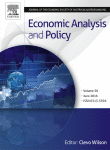
Economic Analysis and Policy
Leading the Way in Economic Insights and Policy DevelopmentEconomic Analysis and Policy is an esteemed academic journal published by ELSEVIER, dedicated to advancing the field of economics and econometrics since its inception in 1970. Based in the Netherlands, this journal plays a pivotal role in disseminating high-quality research that addresses contemporary economic issues and policy challenges. With an impressive Q1 ranking in both the Economics and Econometrics categories, and recognition in the top 91st percentile of Scopus rankings, it is a leading platform for scholars, professionals, and students seeking to contribute to and engage with the evolution of economic thought. The journal does not currently operate on an open access model, allowing it to maintain rigorous peer-review standards that ensure the integrity and impact of published research. As a vital resource for anyone interested in the intersection of theory and policy in economics, Economic Analysis and Policy fosters a community committed to rigorous analysis and innovative solutions in the economic domain.
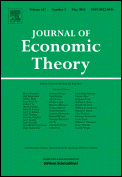
JOURNAL OF ECONOMIC THEORY
Transforming Ideas into Economic ExcellenceThe JOURNAL OF ECONOMIC THEORY, published by Academic Press Inc Elsevier Science, stands as a paramount platform for disseminating groundbreaking research within the field of economics and econometrics. With an impressive history dating back to 1969 and a convergence period extending to 2024, this journal has continually shaped the academic discourse around critical economic theories and methodologies. Currently recognized in the top quartile (Q1) of its category for 2023, it ranks prominently among its peers, boasting an impactful scholarly contribution reflected in its Scopus ranking—positioned at #348 out of 716 journals in the domain. Although it does not offer Open Access, the journal provides an essential resource for those seeking to enhance their understanding of complex economic models and strategies. Researchers, professionals, and students alike will find the JOURNAL OF ECONOMIC THEORY to be an invaluable asset for their academic and professional pursuits in the rapidly evolving landscape of economics.

Panoeconomicus
Bridging Theory and Practice in Economic StudiesPanoeconomicus is a renowned academic journal published by SAVEZ EKONOMISTA VOJVODINE, specializing in the evolving fields of Economics, Econometrics, and Finance. Since its inception as an Open Access publication in 2006, this journal has fostered a collaborative environment for scholars and practitioners to disseminate research that contributes to critical economic discourses. Based in Serbia, and operating within an international context, Panoeconomicus carries an impressive Scopus Rank in the 57th percentile, further reflected in its Q3 category quartile for Economics, Econometrics, and Finance as of 2023. With a commitment to enhancing academic dialogue through readily accessible content, the journal is instrumental in shaping new insights and methodologies available to researchers, finance professionals, and students alike. Its significance in the field continues to grow, particularly as it addresses pressing economic challenges from 2009 to 2024 and beyond, making it a valuable resource for those aiming to stay at the forefront of economic research.

Series-Journal of the Spanish Economic Association
Unlocking the Potential of Open Access Economic ResearchSeries-Journal of the Spanish Economic Association, published by SPRINGER HEIDELBERG, stands at the forefront of economic research, specifically focusing on the diverse and evolving landscape of economics, econometrics, and finance. Since its transition to Open Access in 2010, the journal has provided a platform for innovative research and thought leadership, fostering accessibility and collaboration within the academic community. With an impressive impact reflected in its Q1 classification in the Economics, Econometrics and Finance category, the journal has gained recognition for its commitment to high-quality, rigorous scholarship, as evidenced by its Scopus rank of #98 out of 288, placing it in the 66th percentile. Its purview encompasses a broad range of topics, making it an essential resource for researchers, professionals, and students looking to keep abreast of the latest developments and trends in economics. With its dedication to advancing knowledge from 2010 to 2024, the journal remains a pivotal contributor to the global economic discourse, seeking to bridge empirical research with practical applications.

Pacific Economic Review
Fostering Dialogue Across Economic Disciplines.Pacific Economic Review, published by WILEY, is a prestigious academic journal dedicated to the exploration of economic issues within the Pacific region, including interdisciplinary perspectives across Aerospace Engineering, Development, and Geography, Planning, and Development. With its ISSN 1361-374X and E-ISSN 1468-0106, this journal has established itself as a crucial platform for disseminating high-quality research, evident in its categorization in Q2 across multiple fields for 2023. Researchers and professionals aiming to contribute to the understanding of economic dynamics—especially those affecting the Pacific context—will find this journal an invaluable resource. Even without open access options, the journal provides extensive insights through its articles and has a commendable ranking in Scopus, ranked #329/716 in the Economics and Econometrics category, placing it in the 54th percentile. Through the convergence of knowledge from diverse fields from its inception in 1996 to the present, the Pacific Economic Review serves as a vital conduit for scholarly dialogue and innovative solutions to economic challenges.
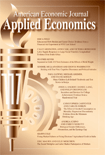
American Economic Journal-Applied Economics
Shaping the Future of Economic Policy Through Rigorous AnalysisWelcome to the American Economic Journal - Applied Economics, a premier publication in the field of applied economics that strives to provide scholars and practitioners with cutting-edge research and insights. Published by the American Economic Association, this journal ranks in the top quartile (Q1) of Economics, Econometrics, and Finance categories as of 2023, reflecting its significant impact and relevance in the field. With a notable Scopus ranking of #5 out of 288 in General Economics and a distinguished percentile of 98th, this journal serves as a vital resource for advancing knowledge in economic theory and its application to real-world issues. Although not open access, it remains accessible to a broad audience, and welcomes submissions that explore innovative methodologies and empirical analyses that bridge theory and practice. Spanning from 2009 to 2024, the journal not only supports rigorous academic discourse but also plays a crucial role in shaping the discourse around effective economic policy. We invite researchers, professionals, and students in the field to engage with the high-quality work published within these pages.
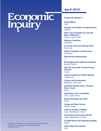
ECONOMIC INQUIRY
Driving Excellence in Economic Inquiry Since 1962.ECONOMIC INQUIRY, published by Wiley, is a prestigious academic journal that has been at the forefront of research in economics and management since its inception in 1962. With an ISSN of 0095-2583 and an E-ISSN of 1465-7295, this journal is renowned for its rigorous peer-reviewed articles, embracing a wide scope of economic and econometric inquiries. Its impressive placement in the Q1 category for both Business, Management and Accounting, and Economics and Econometrics highlights its significance within these fields. With a Scopus rank placing it in the top quartile of Economics and Econometrics journals, alongside a ranking for Business studies, it caters to a diverse audience of researchers, professionals, and students eager to deepen their understanding of economic phenomena. Although it operates under a traditional subscription model and does not offer open access, the journal's contributions are instrumental in advancing knowledge and discourse in economic theory and practice, making it an essential resource for anyone involved in this vibrant discipline.

Ekonomista
Empowering new voices in the field of economic research.Ekonomista is a distinguished open-access journal dedicated to the field of economics, published by the Polskie Towarzystwo Ekonomiczne. Since its transition to open access in 2022, the journal has enhanced its mission to disseminate high-quality research that serves the academic community and informs policymakers. With an ISSN of 0013-3205 and an E-ISSN of 2299-6184, Ekonomista aims to foster rigorous discussions and innovative perspectives on current economic issues. Although it has experienced lapses in coverage through Scopus, its commitment to advancing knowledge in Economics, particularly in the realms of econometrics and finance, remains steadfast. The journal is indexed within the lower echelons of Scopus rankings, providing an opportunity for new voices in the discipline to emerge and contribute to the ongoing discourse. Positioned at ul. Nowy Swiat 49 in Warszawa, Poland, Ekonomista not only connects researchers and professionals but also serves as an educational resource for students aiming to deepen their understanding of economic theories and practices.
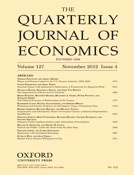
QUARTERLY JOURNAL OF ECONOMICS
Exploring the Frontiers of Economic KnowledgeQUARTERLY JOURNAL OF ECONOMICS is a prestigious and long-established academic journal published by Oxford University Press Inc. With its origins dating back to 1886, this esteemed journal has continually provided a vital platform for the dissemination of cutting-edge research in the field of economics and econometrics. The journal holds an impressive Q1 ranking in the Economics and Econometrics category, positioning it at the forefront of scholarly contribution with a Scopus rank of #2 out of 716, reflecting its standing in the top 1% of the field. Although the journal is not open access, it offers a wealth of vital resources and insights that are indispensable for researchers, professionals, and students alike, as it aims to advance knowledge and influence economic policy and practice through rigorous academic inquiry.